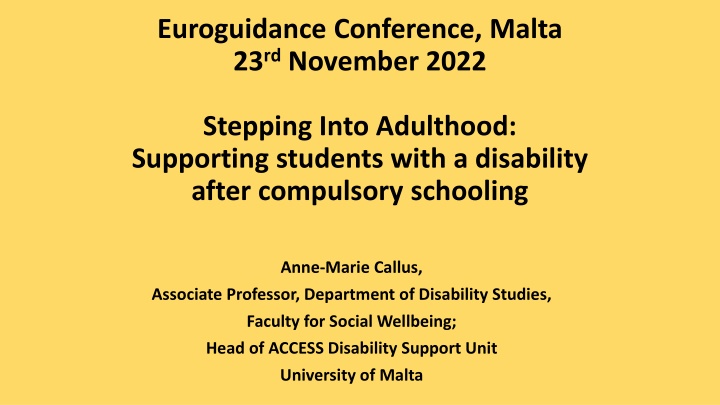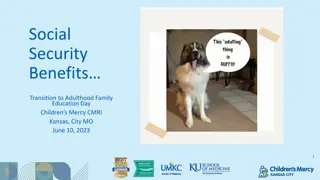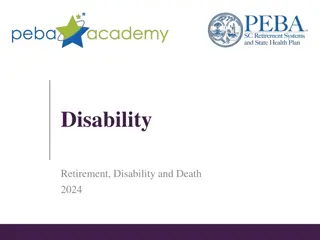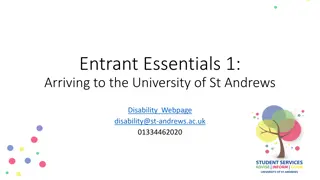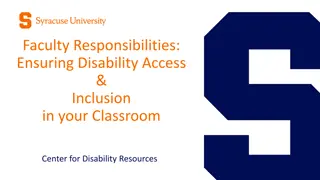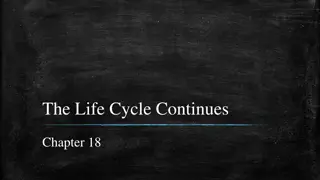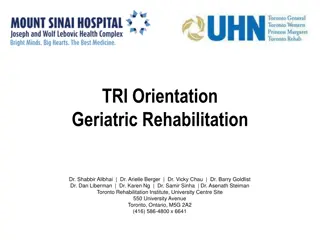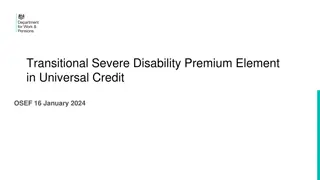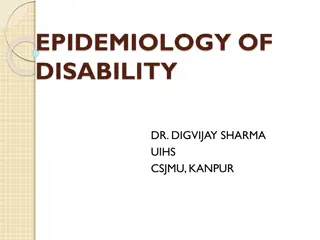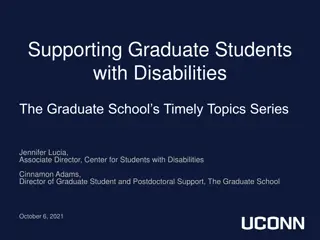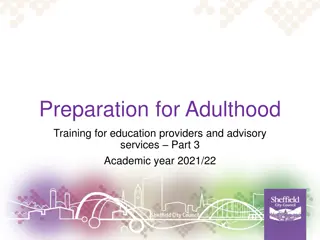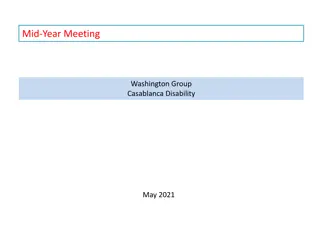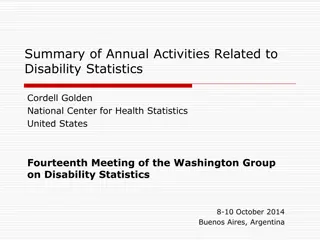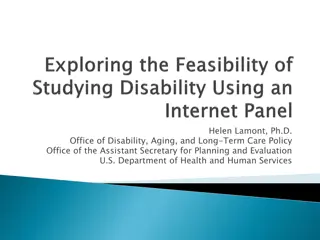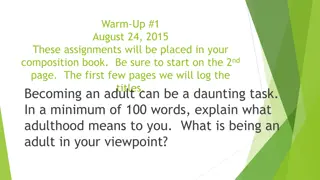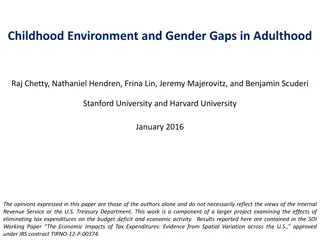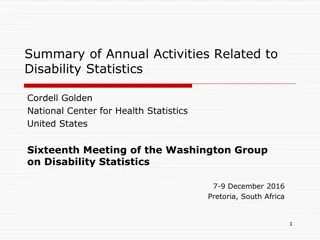Supporting Students with Disability Transitioning to Adulthood
Anne-Marie Callus presents insights on supporting students with disabilities post-schooling, emphasizing independence, societal obstacles, and the importance of tailored support. Explore how education can lay the foundation for an inclusive society that embraces individual needs and fosters autonomy in disabled individuals to lead fulfilling lives.
Download Presentation

Please find below an Image/Link to download the presentation.
The content on the website is provided AS IS for your information and personal use only. It may not be sold, licensed, or shared on other websites without obtaining consent from the author.If you encounter any issues during the download, it is possible that the publisher has removed the file from their server.
You are allowed to download the files provided on this website for personal or commercial use, subject to the condition that they are used lawfully. All files are the property of their respective owners.
The content on the website is provided AS IS for your information and personal use only. It may not be sold, licensed, or shared on other websites without obtaining consent from the author.
E N D
Presentation Transcript
Euroguidance Conference, Malta 23rdNovember 2022 Stepping Into Adulthood: Supporting students with a disability after compulsory schooling Anne-Marie Callus, Associate Professor, Department of Disability Studies, Faculty for Social Wellbeing; Head of ACCESS Disability Support Unit University of Malta
The School as a Mirror of Society the school has a chance to be a miniature community, an embryonic society * the inclusive school as an embryonic inclusive society *Dewey, J. 1956. The school and the curriculum and The child and society. Chicago: Phoenix Books.
Adult Life Employment Continuing education Development of skills and interests Friendships Intimate relationships Forming new families Taking control of one s life Living one s life on one s own terms (within reasonable limits) Shouldering responsibility
Life With a Disability Atypical development trajectories Continued need for help in activities of daily living Seen as problematic when compared with the norm Human development needs to be contextualised
Independence and Disability Adulthood typically characterised by independence, being able to do everyday things on your own For disabled people, independence can include the need for support in daily life. For example: ohaving a shower and getting dressed ohousework oaccess to information and communication otransport Independence: doing things on your own terms, with support where necessary
Support Help which promotes independence rather than perpetuating dependence Help which is provided on terms determined by the person with disability Students with disability should be prepared for adult life in terms of independence and support as understood by persons with disability
Socially Created Obstacles Society has developed along the needs and wishes of persons without disability Social model helps us recognise that the problems met by persons with disability are not just individual problems but also arise from society disability is an evolving concept and results from the interaction between persons with impairments and attitudinal and environmental barriers that hinders their full and effective participation in society on an equal basis with others (Preamble, United Nations Convention on the Rights of Persons with Disabilities, 2006)
Developments in Malta 1994: signing of the Salamanca Statement 2000: enactment of Equal Opportunities (Persons with Disability) Act 2012: ratification of the United Nations Convention on the Rights of Persons with Disabilities 2021: enactment of UNCRPD Act Commitment to change social structures to make them inclusive of persons with disability, rather than expecting the latter to fit into existing structures without making any changes
Policy Documents Policy Documents
Present Opportunities MATSEC exams access arrangements Inclusion in: osixth forms, oMCAST, oUniversity of Malta, among others Jobsplus Inclusive Employment Unit Lino Spiteri Foundation NGOs providing opportunities in sport, performing arts and the arts
Table 1: Early school leaving rates, by disability status (aged 18-24 and 18-29) 35 30 25 20 % 15 10 5 0 Disabled young people (18-24)* Non-disabled (18-24) Disabled young people (18-29)* Non-disabled (18-29) EU27 average 20.3 9.8 21.3 10.9 National average 28.3 19.7 32.6 24.2
Table 2: Completion of tertiary or equivalent education (aged 30-34 and 30-39) 50 45 40 35 30 25 % 20 15 10 5 0 Disabled young people (30-34)* Non-disabled (30-34) Disabled young people (30-39) Non-disabled (30-39) EU27 average 29.4 43.8 30.4 41.7 National average 42.0 34.8 29.2 32.8
Table 3: Activity rates in Malta, by disability and gender (aged 20-64) 100 90 80 70 60 50 % 40 30 20 10 0 Disabled women Disabled men Non-disabled women Non-disabled men Disabled total Non-disabled total EU27 average 59.1 65.4 76.2 88.8 62.0 82.5 National average 37.9 64.7 70.1 90.4 51.1 81.0
What Still Needs to be Done We still need to normalise the idea that some adults continue to need support from others in their daily lives. We still need to move away from the charity and tragedy models of disability, and fully embrace the social model. We still need to listen to the perspectives of persons with disability, which very often are drowned out by the voices of non-disabled persons who think they know what it means to live with a disability. Children with disability are still being raised in an environment where disability is largely seen in terms of negativity.
Transition Planning Focus not only on what is done but how it is done; Students, parents/guardians should be consulted; Students with disability should be involved in their own educational planning from early on, through the IEP process; They should have the support they need to do so; It is in this way that they can learn how to take decisions about their lives, take responsibility and be independent. And it is in this way that we adults can learn how to consult with children and young people.
Transition Process Preliminary meetings and discussions Drawing up of transition plan with objectives Implementation of transition plan Revision of plan Implementation of revised plan During the transition process, students with disability should be in a good position to take the lead have grown up in an environment where their perspectives and opinions are valued are provided with any necessary support to express themselves
What does inclusion mean? Speaking of inclusive education implies that some students are excluded or at risk of being excluded. Likewise, speaking of an inclusive society implies that some persons are excluded or at risk of being excluded. Continuing to increase inclusion in schools can create truly inclusive societies. Inclusion transforms society. The perspectives of those who are excluded are essential for this transformation to take place.
Employment Situation Majority of persons with disability are not in employment Majority of those who are in employment are happy about their job Indications that there are some employers who are inclusive in their attitudes and their practices But much needs to be done to transform the world of work into an inclusive one The perspectives of students with disability can help bring about this transformation because: othere is greater awareness of what their actual needs are and what needs to be done to meet them onon-disabled people (including employers) become more adept at taking the perspectives of persons with disability into account.
In Conclusion Fostering the abilities and skills of students with disability to reflect about their lives and articulate their preferences. Fostering the abilities and skills of adults involved in the lives of students with disability to create opportunities for the latter make their voice heard and their opinions valued. Basing transition planning directly on the perspectives and aspirations of students with disability. Working towards transforming society into one which takes different needs into account and considers the provision of support for persons with disability as an integral part of life.
Any Thank you questions?
